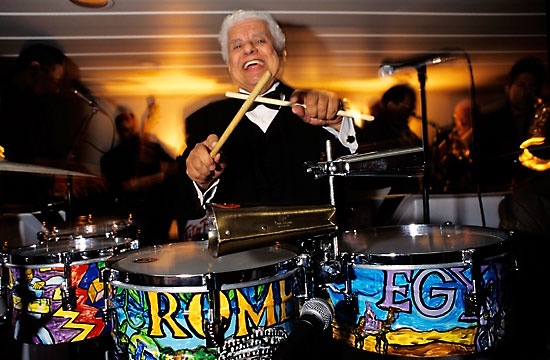Puente, Tito
American musician
byname of Ernest Anthony Puente, Jr.
born April 20, 1923, New York, New York, U.S.
died May 31, 2000, New York
 American bandleader, composer, and musician who was one of the leading figures in Latin jazz. His bravura showmanship and string of mambo dance hits in the 1950s earned him the nickname “King of Mambo.”
American bandleader, composer, and musician who was one of the leading figures in Latin jazz. His bravura showmanship and string of mambo dance hits in the 1950s earned him the nickname “King of Mambo.”The son of Puerto Rican immigrants, Puente grew up in New York City's Spanish Harlem and became a professional musician at age 13. He later studied at the Juilliard School and eventually learned to play a number of instruments, including the piano, saxophone, vibraphone, and timbales (paired high-pitched drums). After an apprenticeship in the historic Machito Orchestra, he served in the navy during World War II.
In 1947 Puente formed his own 10-piece band. With such other musicians as Tito Rodríguez and Perez Prado, he helped give rise to the golden age of the mambo in the 1950s. Puente's infectious energy and dynamic stage presence quickly made him a star. He added to his repertoire other Latin and Afro-Cuban rhythms, including cha-cha, merengue, bossa nova, and salsa, and among his notable songs are "Babarabatiri," "Ran Kan Kan," and "Oye Como Va." Puente also performed with leading jazz performers, including George Shearing and Woody Herman (Herman, Woody), as well as with many stars of Latin music and, in later years, with symphony orchestras.
A prolific musician, Puente recorded some 120 albums during his career and maintained a busy tour schedule, playing 200–300 engagements a year, until shortly before he died. He also was responsible for introducing a number of Latin musicians to American audiences, most notably singer Celia Cruz (Cruz, Celia). The recipient of numerous honours, he received five Grammy Awards. Puente also performed in several films, including Radio Days (1987) and The Mambo Kings (1992).
- Pien-tsung-lun
- piepoudre court
- pier
- Pierce Brosnan
- Pierce Butler
- pierced work
- Pierce Egan, The Elder
- Pierce, Franklin
- Pierce, George Washington
- Pierce, Jane
- Pierce, John Davis
- Pierce, John Robinson
- Pierce, Sarah
- Pierce, The Elder Egan
- Pierina Legnani
- Pierino Belli
- Pieris
- Pier Leone Ghezzi
- Pier Luigi Nervi
- Piero della Francesca
- Piero di Cosimo
- Piero di Cosimo de' Medici
- Piero di Lorenzo de' Medici
- Piero di Tommaso Soderini
- Pier Paolo Pasolini